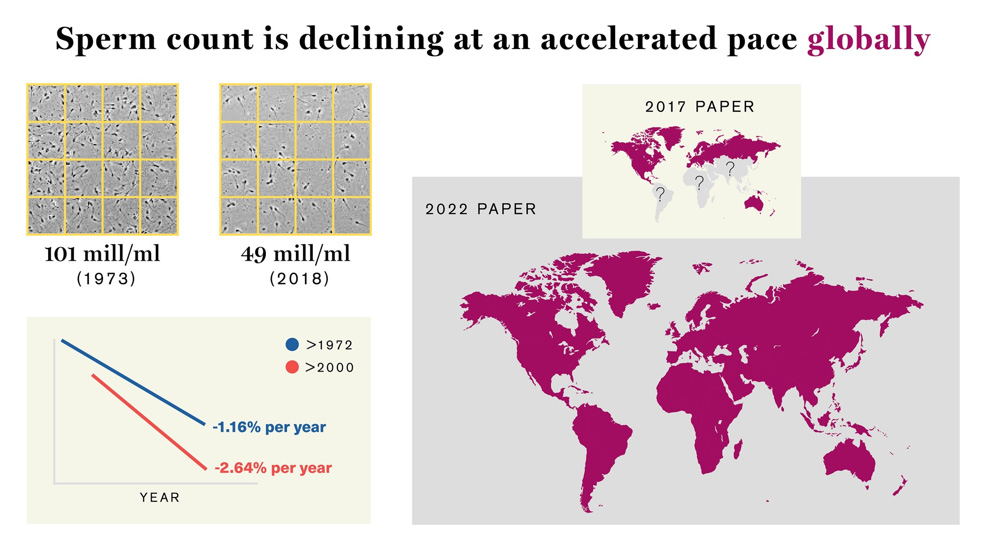
2nd December 2022 Shocking decline in human sperm counts A study in the journal Human Reproduction finds that human sperm counts fell by 62% in the last 50 years – possibly a result of poor diets, combined with a toxic soup of "forever chemicals" in our air and water.
An international team of researchers, led by the Hebrew University of Jerusalem and the Icahn School of Medicine at Mount Sinai, New York, has published the first meta-analysis to confirm declining sperm counts among men from South and Central America, Asia and Africa. In addition to those regions, their study shows that the decline of sperm counts in North America, Europe, and Australia – reported by this team in 2017 – continues and is even accelerating now. Sperm count is not only an indicator of human fertility; it also reflects men's health, with low levels being associated with increased risk of chronic disease, testicular cancer and a decreased lifespan. The authors of this study conclude that the ongoing decline of human sperm counts is a global crisis related to our modern environment and lifestyles, with implications for the long-term survival of our species. This new analysis, using data from 53 countries, includes an additional seven years of data (2011-2018) and focuses on sperm count trends among men in regions not reviewed previously, specifically South America, Asia, and Africa. It shows, for the first time, that men in those regions share the significant decline in total sperm counts (TSC) and sperm concentration (SC) seen previously in North America, Europe, and Australia. Furthermore, this study shows an accelerated post-2000 decline in TSC and SC globally. From 1973 to 2018, the average sperm concentration fell from an estimated 101.2 million per ml to 49.0 million per ml – a drop of 51.6%. Total sperm counts fell by 62.3% during the same period.
While the study is focused more on data and trends, rather than solving the mystery behind them, one of its authors believes there are convincing reasons to explain the worldwide decline in sperm counts. Professor Hagai Levine, from the Hebrew University of Jerusalem, points to recent research on disturbances in the development of the reproductive tract during fetal life, which are linked to lifetime impairment of fertility and other markers of reproductive dysfunction. Additionally, he explains that "lifestyle choices and chemicals in the environment are adversely affecting this fetal development." Time is running out, he warns: "Our findings serve as a canary in a coal mine. We have a serious problem on our hands that, if not mitigated, could threaten humankind's survival. We urgently call for global action to promote healthier environments for all species, and reduce exposures and behaviours that threaten our reproductive health." Study co-author, Professor Shanna Swan from the Icahn School of Medicine at Mount Sinai, New York City, adds: "The troubling declines in men's sperm concentration and total sperm counts at over 1% each year as reported in our paper are consistent with adverse trends in other men's health outcomes, such as testicular cancer, hormonal disruption, and genital birth defects, as well as declines in female reproductive health. This clearly cannot continue unchecked." "The key point that needs to be made is that this is desperately bad news for couple fertility," said Professor Richard Sharpe, an expert in male reproductive health from the University of Edinburgh. "But these issues are not just a problem for couples trying to have kids – they are also a huge problem for society in the next 50-odd years, as less and less young people will be around to work and support the increasing bulge of elderly folk." Unless a solution is found, the world may be heading for a scenario reminiscent of the 2006 movie Children of Men. A dystopian thriller set in 2027, it depicts humanity on the brink of collapse, due to total infertility. A similar theme is explored in the recent TV series The Handmaid's Tale. Our real-life fertility problem is not quite as severe or urgent as those fictional examples (and some may even argue that fewer humans is a good thing). Nevertheless, this new study is an important reminder of a long-term trend facing our species, which needs to be addressed if we wish to survive into future centuries, and will undoubtedly create major issues for society.
Comments »
If you enjoyed this article, please consider sharing it:
|








